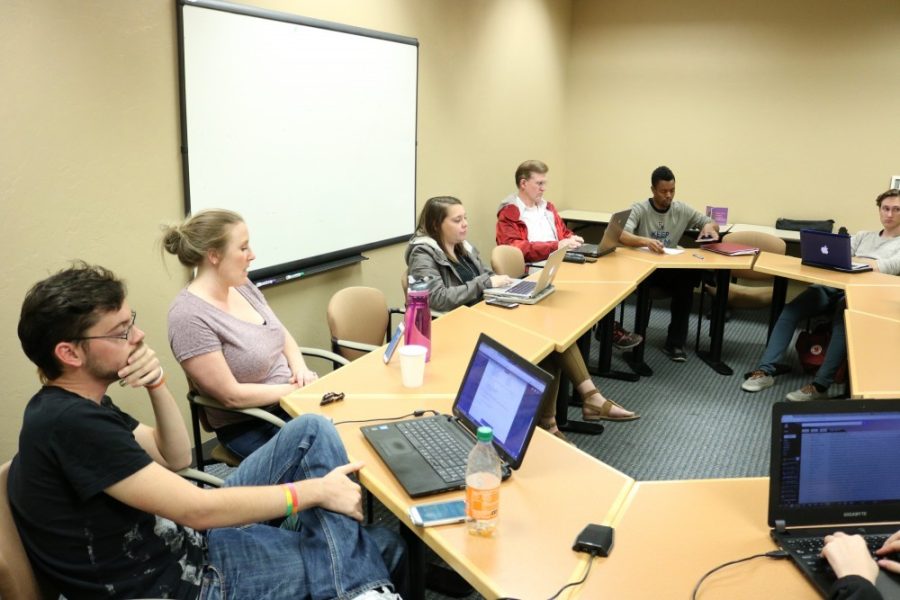During their April 18 meeting, the Graduate and Professional Student Council proposed changes to its governing documents that will alter the way the council is run.
Documents obtained by The Daily Wildcat, including a copy of the proposed constitution, show drafts of changes to the GPSC constitution, bylaws and elections code for the 2019 fiscal year.
The draft constitution proposes the removal of term limits for both the general council and executive board.
RELATED: Graduate (and undergrad) students prepare to ‘Showcase’ research
The proposal comes a year after the council voted to add term limits to the constitution.
The GPSC bylaws outline responsibilities of each person serving in GPSC, whether they were elected or support staff. A draft of proposed changes to those bylaws show officer and representative responsibilities being rolled back.
According to GPSC Social Chair and College of Fine Arts Pepresentative Marie Teemant, current representatives were not being held to current standards to begin with, and scaling back responsibilities would allow accountability. She also highlighted that those serving on GPSC are graduate students.
“They’re not getting paid by the hour,” Teemant said. “We need to be respectful of their time, what those responsibilities look like and what they consist of.”
GPSC is the elected student council for the Graduate College, tasked with representing graduate and professional students on issues affecting them.
The council is made up of two parts. The first is an executive board with a president, executive vice president and administrative vice president elected by the entire student body.
The executive board also has four officer positions — secretary, assembly chair, treasurer and social chair — which are filled by already elected general council representatives through internal elections.
The second part is the general council, made up of representatives elected from each college, along with three representatives elected by the student body.
Currently, each college elects one representative per 400 full-time equivalent students in that college.
However, the draft constitution proposes each college be alloted one voting representative and one non-voting alternate.
For Teemant, the current proportion model conflicts with the growth of certain graduate colleges over others.
“The system that we have now is an endlessly growing body of representatives, and that’s just untenable,” Teemant said.
General council and executive board members are elected annually to one-year terms. Currently, individuals are only allowed to serve five elected terms in any combination of representative and executive board positions, and three terms in any combination of executive board positions.
The elections code of GPSC is the document that governs how elections are run. Per the current code, the general elections are held in the spring, and special elections are held under exceptional circumstances.
In fall 2017, GPSC was scheduled to hold a special election because not all seats were filled in the general election the previous spring. However, the election was not held.
Teemant was not happy with the decision.
“That was a decision that was made without the executive board and without the general council,” Teemant said.
To fill those vacant seats, the council used the process of reaching out to candidates who wanted to run in the special election and internally voted those candidates in.
A draft elections code would not only allow that process if a seat becomes vacant in the middle of the year. It would also mandate a special election be held if the council seats less than half its total seats or if there is a vacant seat for an executive officer.
Part of the reason for these changes is to clarify the role of GPSC. For current administrative vice president Dustin Tran, the clarity of the current governing documents has become an obstacle to governing efficently.
“I think one of the issues that’s come up this year a lot is ‘Well, the governing docs say xyz, and that’s what we have to follow,’” Tran said. “Or a lot of it has come up with the opposite, where it’s not defined in our governing docs, therefore we cannot do it.”
RELATED: GPSC Notebook Feb. 5: Engagement with other grads a concern
None of the changes are finalized yet.
“We are still ironing those out to ensure their congruency moving forward,” said David Contreras, GPSC treasurer.
All of the changes will be voted on by next year’s general council, which will meet for the first time on May 14.
Follow Jordan Williams on Twitter









